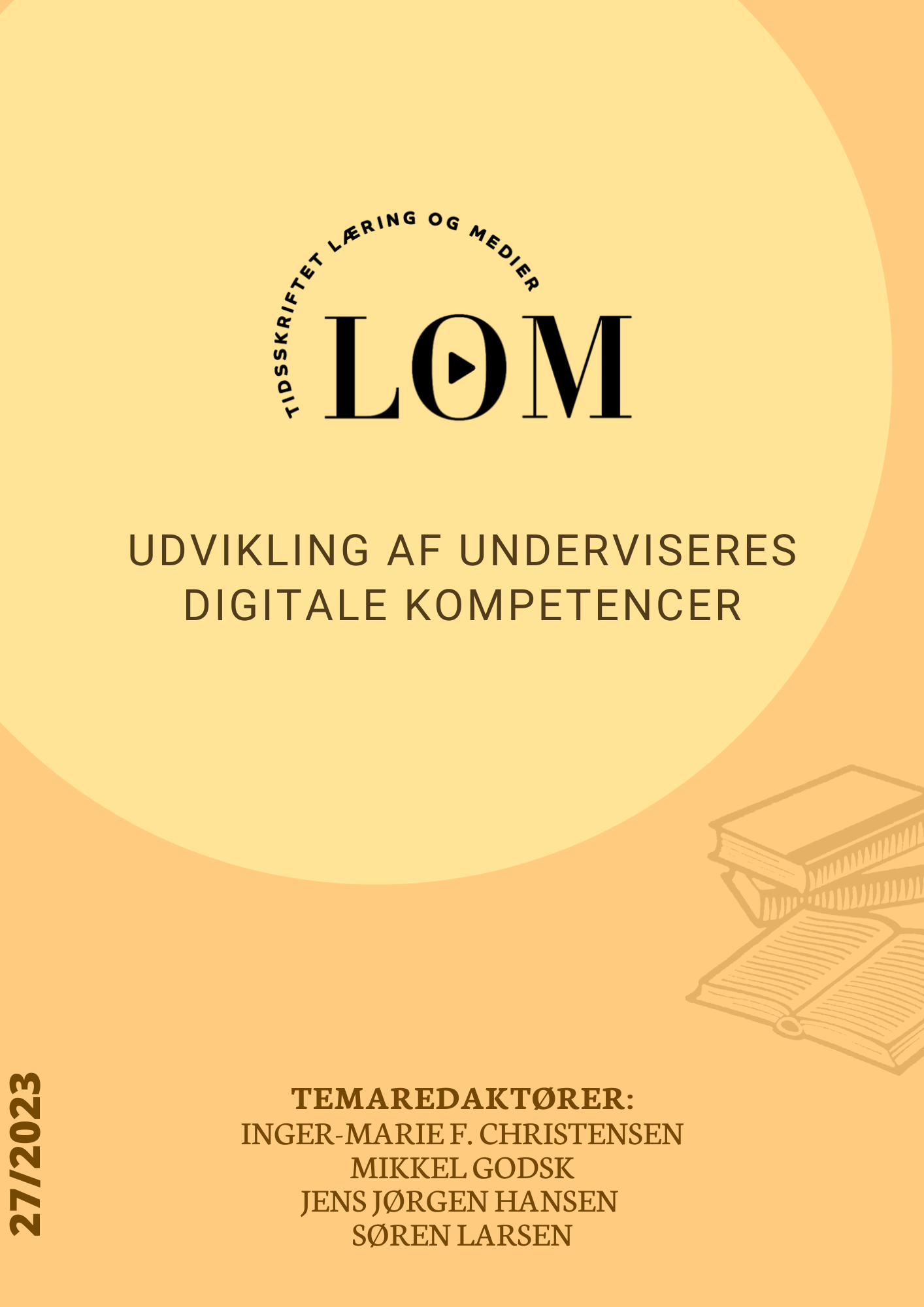Digital kompetenceudvikling gennem udviklingslaboratorier
DOI:
https://doi.org/10.7146/lom.v15i27.134152Keywords:
Laboratorieformat, Kompetenceudvikling, Artikulationsarbejde, Teknologiforståelse, LæreruddannelseAbstract
The article describes and analyzes how a laboratory format has been used in lecturers’ professional development in a nationwide project on technological literacy and computational thinking (in Danish “teknologiforståelse”) in teacher training programs. In terms of content, the professional development activity needs to embrace both a technological, a subject-related and a teaching-and-learning dimension. In the project, the point of departure was the idea of the laboratory as a place demarcated from the ordinary world, where participants can ask new types of questions through practical work with investigations and experiments, and where the format is potentially transformative for teaching practice, as the format offers a framework which is open for experimentation. The article studies how participants implement (enact) the laboratory format in practice. The initial thesis is that the development laboratory is a loosely defined format that, to a large degree, is shaped by both coordinators and participants. The article analyses these processes as articulation work, i.e., coordination and structuring work that is performed to make practice work. Different actor perspectives related to the development laboratories are examined based on observations and interview data. Through this, a diversity of perspectives and experiences are illustrated. Based on the analyses, it is concluded that it is possible to realize the laboratory format according to its intentions, but also that the implementation of the format in a more routinised form entails greater challenges.
Downloads
References
Andersen, B. L., Ebsen, R. O., Fonfara, A. M., Hjorth, M., Jepsen, K. N., Lorentzen, R. F., Madsen, P. H., Møller, L., Nielsen, L., Prætorius, J. L., Petersen, N. A. I., Rehder, M. M. & Schou, D. V. (2021). National undersøgelse af grundlag for udviklingslaboratorier som metode til fag- og kompetenceudvikling i teknologiforståelse som led i dansk og PL på Læreruddannelsen. Danske Professionshøjskoler.
Baker, K.S. & Millerand, F. (2007). Articulation work supporting information infrastructure design: coordination, categorization, and assessment in practice, Proceedings of the 40th international conference on systems sci-ence, HICSS40, IEEE Computer Society, New Brunswick, NJ.
Basballe, D. A., Hjorth, M., Iversen, O. S., Caspersen, M., Lundgaard Hansen, B., & Holm Kanstrup, K. (2021). Gap-analyse af teknologiforståelse i det danske uddannelsessystem fra grundskole til ungdomsuddannelser. Danske Professionshøjskoler. https://xn--danskeprofessionshjskoler-xtc.dk/wp-content/uploads/2021/01/gap-analyse.2021.pdf
Braun, V., Clarke, V., Hayfield, N., Terry, G. (2018). Thematic Analysis. In: Liamputtong, P. (red.) Handbook of Research Methods in Health Social Sciences. Springer, Singapore.
Børne- og undervisningsministeriet (2021): Forsøg med teknologiforståelse i folkeskolens obligatoriske under-visning. Slutevaluering. https://emu.dk/sites/default/files/2021-09/gsk_teknologiforst%C3%A5else_evalueringsrapport.pdf
Carroll, J. M. (2002). Scenarios and Design Cognition. Proceedings of the IEEE Joint International Conference on Requirements Engineering (RE’02).
Corbin, J.M. & Strauss, A.L. (1993). The articulation of work through interaction, The Sociological Quarterly, 34(1), pp. 71-83.
Hansen, J. & Georgsen, M. (under udgivelse). Underviseres digitale kompetencer. Kompetencedimensioner i projektet Læringscirkler. Tidsskriftet Læring Og Medier (LOM), 15(27).
Hutchins, E. (1995). Cognition in the wild. Cambridge, MA: The MIT Press
Kelentrić, M., Helland, K., & Arstorp, A. T. (2017). Professional digital competence framework for teachers. The Norwegian Centre for ICT in education, 1-74.
Kornholt, B., Wiskerchen, M., Oxenvad, C.M., Køhrsen, L., Ebsen, R.O., Emtoft, L.M., Jespersen, P., Madsen, P.H., Møller, L.D., Nielsen, L., Schou, D.V., Andersen, L.B. (2021). Udviklingslaboratorier som metode til kompetenceudvikling i teknologiforståelse på læreruddannelsen. TEKFAG (upubliceret).
Redecker, C. & Punie, Y. (2017). European framework for the digital competence of educators: DigCompEdu (No. JRC107466). Joint Research Centre. doi:10.2760/159770.
Schmidt, L-H. (1988). Viljen til orden. Aarhus: Modtryk.
Schmidt, K., & Simone, C. (2000). 'Mind the gap! Towards a unified view of CSCW,' in COOP2000. The Fourth International Conference on the Design of Cooperative Systems, Sophia Antipolis, France, 23-26 May 2000, INRIA Sophia Antipolis, France
Sofkova Hashemi, S. (2019). Lärares digitala kompetens. I: Godhe, A. & Sofkova Hashemi, S.(red.). Digital kom-petens för lärare, 141-149, Gleerups Utbildning AB
Staunæs, D. et al (2014). Læringslaboratorier og – eksperimenter. Aarhus Universitetsforlag.
Strauss, A. (1985). Work and the division of Labor. The Sociological Quarterly, 26(1), pp. 1-19.
Strauss, A. (1988). The Articulation of project work: An organizational process. The Sociological Quarterly, 29 (2), ff. 163-178
Strauss, A. (1993). Continual Permutations of Action. Aldine DeGruyter, NewYork.
Uddannelses- og Forskningsministeriet (2022). En ambitiøs læreruddannelse tæt på folkeskolen og til gavn for folkeskolen. ufm.dk/lovstof/politiske-aftaler/aftale-om-reform-af-laereruddannelsen-13-september-2022.pdf.
Undervisningsministeriet (2019): Læseplan for forsøgsfaget teknologiforståelse. https://emu.dk/sites/default/files/2019-02/GSK.%20L%C3%A6seplan.Tilg%C3%A6ngelig.%20Teknologiforst%C3%A5else.%20pdf.pdf
Downloads
Published
How to Cite
Issue
Section
License
Copyright (c) 2023 Marianne Georgsen, Rasmus Jørnø, Lars Petersen, Oliver Tafdrup

This work is licensed under a Creative Commons Attribution-NonCommercial-NoDerivatives 4.0 International License.

Articles published in the Journal of Learning and Media are licensed under a Creative Commons Attribution-NonCommercial-NoDerivatives 3.0 Unported Licens.
Authors retain copyright and grant the journal right of first publication; simultaneously articles are licensend under the Creative Commons Attribution license: Attribution-NonCommercial-NoDerviatives (by-nc-nd). Read about this license at https://creativecommons.org/licenses/by-nc-nd/3.0/
---
At LOM.dk, you will also find articles from the discontinued Journal for the Continuing and Further Education of the Danish Universities (UNEV). Note that special rules apply to UNEV articles:
It is the authors and any other copyright holder who have the copyright of articles published under the auspices of UNEV, and access to the articles is contingent on users acknowledging and complying with the associated legal guidelines:
- Users may download and print one copy of any UNEV publication for private studies or research.
- The redistribution of articles or the use of these for revenue-funded activities or commercial purposes are not allowed.
- It is not allowed to distribute the URLs of UNEV articles.


